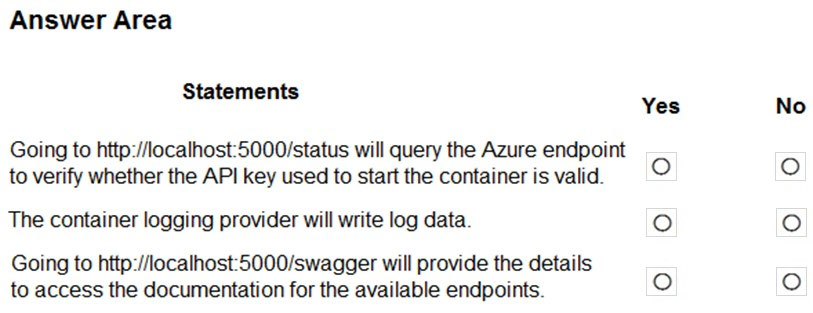HOTSPOT -
You run the following command.

For each of the following statements, select Yes if the statement is true. Otherwise, select No.
NOTE: Each correct selection is worth one point.
Hot Area:

HOTSPOT -
You run the following command.

For each of the following statements, select Yes if the statement is true. Otherwise, select No.
NOTE: Each correct selection is worth one point.
Hot Area:


Box 1: Yes -
http://localhost:5000/status : Also requested with GET, this verifies if the api-key used to start the container is valid without causing an endpoint query.
Box 2: Yes -
The command saves container and LUIS logs to output mount at C:\output, located on container host
Box 3: Yes -
http://localhost:5000/swagger : The container provides a full set of documentation for the endpoints and a Try it out feature. With this feature, you can enter your settings into a web-based HTML form and make the query without having to write any code. After the query returns, an example CURL command is provided to demonstrate the HTTP headers and body format that's required.
Reference:
https://docs.microsoft.com/en-us/azure/cognitive-services/luis/luis-container-howto
Yes No Yes Log location is not mounted. The ET answer relates to an example provided on the given website which DOES mount a log location.
YNY is the answer. https://learn.microsoft.com/en-us/azure/cognitive-services/language-service/text-analytics-for-health/how-to/use-containers?tabs=language#validate-that-a-container-is-running - http://localhost:5000/status Also requested with GET, this URL verifies if the api-key used to start the container is valid without causing an endpoint query. This request can be used for Kubernetes liveness and readiness probes. - http://localhost:5000/swagger The container provides a full set of documentation for the endpoints and a Try it out feature. With this feature, you can enter your settings into a web-based HTML form and make the query without having to write any code. After the query returns, an example CURL command is provided to demonstrate the HTTP headers and body format that's required.
Documentation says it will NOT cause an endpoint query, so I think the first one should be NO
Correct!
1 and 3, is true: https://learn.microsoft.com/es-es/azure/cognitive-services/language-service/sentiment-opinion-mining/how-to/use-containers#validate-that-a-container-is-running 2, i think, is yes... (by docker settings)
No --> Also requested with GET, this URL verifies if the api-key used to start the container is valid without causing an endpoint query. https://learn.microsoft.com/en-us/azure/ai-services/language-service/text-analytics-for-health/how-to/use-containers?tabs=language#validate-that-a-container-is-running No -- there isn't any Log location mounted (same link as above) Yes --> correct, swagger show a full set of documentation for the endpoints Yes.
sorry the last yes is a typo
A modified version of this was in the exam today.
Going to http://localhost:5000/status will query the Azure endpoint to verify whether the API key used to start the container is valid. Yes. Typically, Azure Cognitive Services containers provide a /status endpoint that can be used to check the status of the service, including the validity of the API key. Since the service is mapped to localhost:5000, accessing this URL should provide the status of the containerized service, including the API key's validity. The container logging provider will write log data. No (Assuming). This statement is somewhat ambiguous and depends on the configuration of the Docker container and the Azure Cognitive Services container. Going to http://localhost:5000/swagger will provide the details to access the documentation for the available endpoints. Yes. It is a common practice for web services and APIs, including those provided by Azure Cognitive Services, to offer a Swagger UI at a /swagger endpoint.
No ("without causing an endpoint query"), No, Yes
Agree with you: - http://localhost:5000/status "Also requested with GET, this URL verifies if the api-key used to start the container is valid WITHOUT CAUSING AN ENDPOINT QUERY." (According to documentation)
Fintal Answer: Yes No Yes
I think the first one is YES https://learn.microsoft.com/en-us/azure/cognitive-services/language-service/text-analytics-for-health/how-to/use-containers?tabs=language#validate-that-a-container-is-running
on exam, YNY
Yes No Yes
YNY is the answer.